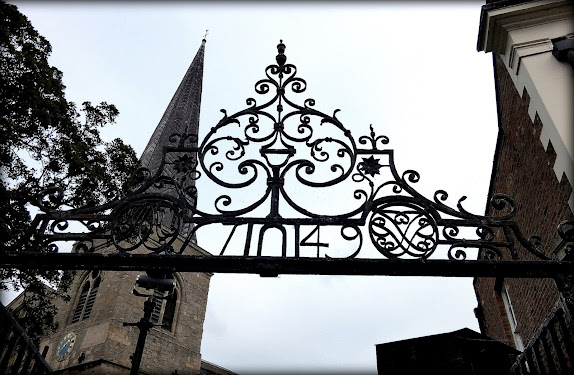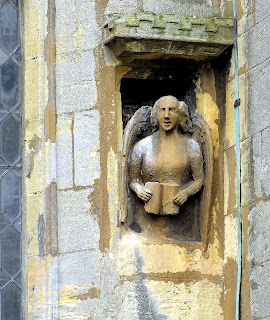Quosdam daemones quos dusios Galli Nuncipant
St Austin
I've shown Pilot Street before, it runs alongside St Nicholas Chapel until it is abruptly terminated by some of that modern housing I mentioned the other day. Clearly it has been abridged at some point and the new John Kennedy Road cut through and taken it over but it used to run as far as the junction with Loke Road. I found the following on a Facebook group showing almost the same view as above from I'm guessing late 1950s very early 1960s, all the right hand side buildings are gone as is the chapel on the left with the road sign. What now looks picturesque and tree filled was once very domestic and gritty. But we are not here to gawp at pretty things ...
The street is ancient, at least 14th century possibly much, much older and back then had a different name, Dowshill Street. In those days the sea was practically knocking on Lynn's door and just to the north of the borough was a wild and "dreary, unfrequented spot", most likely there were sand dunes, the History of the Borough of King's Lynn refers to "the sands of Lenn at Dusehill". The same source gives evidence of a belief in malicious spirits, that the region to the north of the borough was "the abode of hobgoblins, sprites, and other indescribable monsters" (quite possibly still is) and that even the Loke was named after the supreme evil one of the Norsemen, Loke or Loki. The name Dowshill, it is thereby claimed, comes from the ancient northern European word duus or dusiens or deuce or as we say these days, the Devil.
So what I can tell you about what is known of Dowshill and its street. Old maps and records show a bridge over a fleet at the north end (now called the Fisher Fleet but then known as Dowshill Fleet). It is thought that there was a saltern at this point, where brine was boiled to make salt, no doubt adding to its devilish aura. The Corporation built canals off the fleet so that ships could moor at merchants' houses. It became so popular that local ship owners complained they could not moor their own boats due to the presence of large foreign vessels in the creek. An ordinance was issued saying the creek was for local ships.
The bridge had a gate on it for defense and gate keepers were appointed every year. So, for example, we find in 1403 John Groute was appointed keeper of Douz Hill Yard.
By the mid 18th century, however, the fleet had fallen into disrepair and the Corporation was sued by a merchant named Turner for not cleansing the creek. The judge , one Lord Mansfield, using quite bizarre logic, affirmed that as the Corporation's charter did not include a prescription to carry out the cleansing no such duty existed (even though they had done so for centuries) and further that what had been used as a public right of way (the creek) was in fact private property (it was never stated who it belonged to). This, I'm told, was a unique judgement in English Law, the absence of a claim it was public was enough to make it private ...
18th and 19th century engineering gradually eased the river bank westwards and marshes to the north were drained, the sea retreated a couple of miles to the north, the Enlightenment reached even wildest Norfolk and the Devil's Hill lost its fears, until in 1809, King's Lynn renamed a lot of streets and Dowshill Street became Pilot Street complete with a Pilot's House.



























































